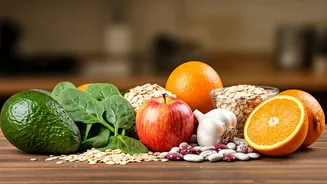Oats: Heart's Ally
Oats are an excellent choice for a cholesterol-conscious diet due to their high soluble fiber content. This fiber acts like a sponge, absorbing cholesterol in the digestive
system and preventing its absorption into the bloodstream. Including oats in your diet can be as simple as starting your day with a bowl of oatmeal. For enhanced benefits, consider adding fruits like berries, which add both flavor and antioxidants. Studies have consistently shown that regular oatmeal consumption can lead to a noticeable drop in LDL (bad) cholesterol levels. The soluble fiber in oats binds with cholesterol in the small intestine, thus facilitating its removal from the body through bowel movements. A simple and nutritious breakfast of oats is an ideal starting point for a day focused on managing cholesterol levels.
Beans: Fiber Powerhouse
Beans are an exceptionally rich source of soluble fiber, making them another powerful ally in the fight against high cholesterol. There's a diverse variety of beans, including kidney beans, navy beans, and lentils. Incorporating them into your meals offers both versatility and significant health benefits. Beans are incredibly versatile and can be added to soups, salads, or used as a side dish. The soluble fiber in beans plays a vital role in binding with cholesterol within the digestive system, thereby preventing its absorption into the bloodstream. Additionally, beans provide a feeling of fullness, which can help in weight management, indirectly supporting cholesterol reduction. Regularly consuming beans can significantly contribute to lowering LDL cholesterol levels. For optimal results, aim to include beans in your diet several times a week, capitalizing on their cholesterol-lowering properties.
Fatty Fish: Omega-3 Boost
Fatty fish, such as salmon, mackerel, and sardines, are abundant in omega-3 fatty acids, which play a crucial role in lowering LDL cholesterol and raising HDL (good) cholesterol levels. These beneficial fats also reduce triglycerides, another type of fat in the blood that can contribute to heart disease. The American Heart Association recommends eating at least two servings of fatty fish per week. Consider grilling, baking, or poaching fish to preserve its nutritional value and minimize added fats. Omega-3 fatty acids help reduce inflammation in the body, which can further reduce the risk of heart disease. Furthermore, the omega-3s assist in preventing the formation of blood clots, providing a comprehensive approach to heart health. Consistent intake of fatty fish can lead to notable improvements in your cholesterol profile.
Nuts: Healthy Snack
Nuts, especially almonds, walnuts, and cashews, are rich in healthy fats, fiber, and plant sterols, which can help lower LDL cholesterol. Regularly consuming a handful of nuts can significantly improve cholesterol levels. Nuts provide monounsaturated and polyunsaturated fats that contribute to reducing LDL cholesterol. They also offer fiber, which further aids in cholesterol reduction. Plant sterols in nuts block cholesterol absorption in the gut. Ensure you select unsalted nuts to avoid excess sodium. A daily serving of nuts as a snack or added to salads can make a substantial difference in your cholesterol levels. Including nuts in your diet is a straightforward method to promote heart health.
Avocado: Cholesterol Controller
Avocados are packed with monounsaturated fats, which are highly effective in lowering LDL cholesterol levels. They also provide fiber and plant sterols, contributing to their cholesterol-reducing benefits. Easily incorporate avocado into your diet through salads, sandwiches, or even as a creamy alternative to butter. The healthy fats in avocados help in raising HDL cholesterol, further enhancing their positive impact on heart health. Consuming avocado can improve the overall lipid profile, supporting cardiovascular well-being. Adding avocado to your meals offers a tasty and nutritionally sound method to manage your cholesterol levels. These creamy fruits are versatile and improve the health aspects of the diet.
Olive Oil: Heart Healthy
Olive oil, particularly extra virgin olive oil, is a staple of the Mediterranean diet and a key element in lowering cholesterol levels. Rich in monounsaturated fats and antioxidants, it significantly reduces LDL cholesterol while increasing HDL cholesterol. Use olive oil in cooking, for salad dressings, or as a finishing touch to dishes. The antioxidants present in olive oil protect against oxidative stress, supporting overall cardiovascular health. Opting for extra virgin olive oil ensures you get the most benefits, as it contains higher levels of beneficial compounds. Regular use of olive oil can improve your cholesterol profile and contribute to a healthier heart. Integrating olive oil into your daily diet is simple and yields considerable rewards.
Fruits and Vegetables
A diet rich in fruits and vegetables is crucial for lowering cholesterol naturally. These foods are packed with fiber, vitamins, minerals, and antioxidants, which contribute to improved heart health. Focus on incorporating a wide variety of colorful produce, such as apples, berries, spinach, and broccoli. Soluble fiber, found in many fruits and vegetables, helps in binding with cholesterol and removing it from the body. Antioxidants protect against cellular damage, which is essential for heart health. Furthermore, these foods promote a sense of fullness, aiding in weight management. A balanced diet centered around fruits and vegetables provides vital nutrients for the body. By consuming a wide variety of produce, you equip your body with the tools it needs to maintain a healthy cholesterol level and promote overall well-being.













